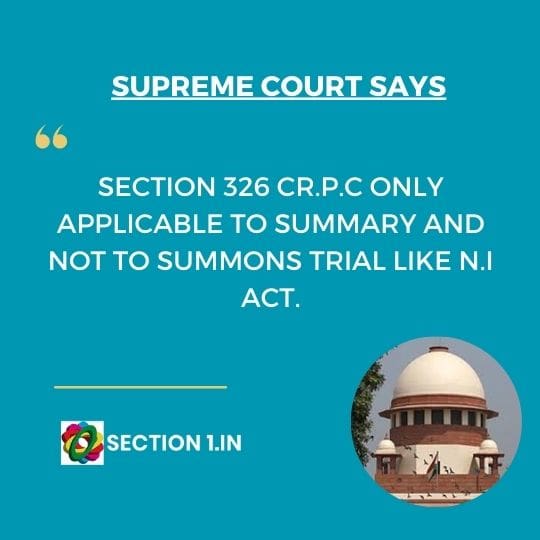N.I ACT AND DE-NOVO TRIAL
48. The High Court in the present cases remanded the matters for de novo trial on the basis of flawed application of Nitinbhai’s case, in spite of the fact that these cases are pending for over a decade. It went unnoticed by the High Court that the appellants have raised the plea of mode of trial due to change of Magistrate for the first time before the High Court. The same has not been raised when the change of Magistrate took place in the Court below during the course of trial. This clearly shows that only for the purpose of protracting the litigation, the plea has been taken for the first time. Had it been their case that because of the procedure adopted by the Court substantial miscarriage has taken place, they would have raised this plea at a much early stage of the proceedings.
xxx
55. In the present cases on hand, without strong, cogent, unimpeachable evidence on record that cases were tried ‘summarily’ but not as regular trial, the Court below gravely erred in remanding them to the Trial Court for a de novo trial.
56. It is worthwhile to mention that in one of the present cases, the Trial Court took about six years to acquit the accused and then High Court took about six and half years to remit the matter to the Trial Court on a technical ground of mode of trial i.e. being summary trial. Special Leave Petition against the order of High Court has been filed on 28th April, 2012. Thus, about 14 years have elapsed, without definitive determinative conclusion of the case on merits. Thus, the whole purport of expeditious trial under N.I. Act has been preposterously
frustrated.
57. Thus, we are of the considered opinion that the Courts while dealing with the matters under the N.I. Act should keep in mind that the difference between summary and summons trial for the purpose of N.I. Act is very subtle but has grave repercussions in case of mistaken identification of trial which is de novo trial in the light of Sec 326 (3) of the Code.
WHEN A DE-NOVO TRIAL SHALL BE GRANTED
58. A de novo trial should be the last resort and that too only when such a course becomes so desperately indispensable. It should be limited to the extreme exigency to avert “a failure of justice”. Any omission or even the illegality in the procedure which does not affect the core of the case is not a ground for ordering a de novo trial. This is because the appellate Court has got the plenary powers to revaluate and reappraise the evidence and to take additional evidence on record or to direct such additional evidence to be collected by the Trial Court. But to replay the whole laborious exercise after erasing the bulky records relating to the earlier proceedings by bringing down all the persons to the Court once again for repeating the whole depositions would be a sheer waste of time, energy and costs unless there is miscarriage of justice otherwise. Hence the said course can be resorted to when it becomes imperative for the purpose of averting “failure of justice”. The superior Court which orders a de novo trial cannot afford to overlook the realities and the serious impact on the pending cases in trial courts which are crammed with dockets, and how much that order would inflict hardship on many innocent persons who once took all the trouble to reach the Court and deposed their versions in the very same case. The re-enactment of the whole labour might give the impression to the litigant and the common man that law is more pedantic than pragmatic. Law is not an instrument to be used for inflicting 0fferings on the people but for the process of justice dispensation [See State of M.P. Vs. Bhooraji (2001) 7 SCC 679].
59. Thus, in summation, we are of the considered opinion that the exercise of remitting the matter to Trial Court for de novo trial should be done only when the appellate Court is satisfied after thorough scrutiny of records and then recording reason for the same that the trial is not summons trial but summary trial. The non-exhaustive list which may indicate the difference between both modes of trial is framing of charges, recording of statement under sec 313 of the Code, whether trial has been done in the manner prescribed under Sections 262-265 of Cr.P.C, how elaborately evidence has been adduced and taken on record, the length of trial etc. In summary trial, the accused is summoned, his plea is recorded under sec 263 (g) of Cr.P.C. and finding thereof is given by the Magistrate under Section 263 (h) of Cr.P.C. of his examination.
60. The ratio in Nitinbhai must not be followed mechanically to remand matters to trial courts for de novo trial. There should be proper application of judicial mind and evidence on record must be thoroughly perused before arriving at any conclusion with regard to mode of trial.
PARTY: V. BAHARUNI & ANR v.STATE OF GUJARAT & ANR – (Criminal Appeal No. 2221 of 2014) – OCTOBER 16, 2014.




